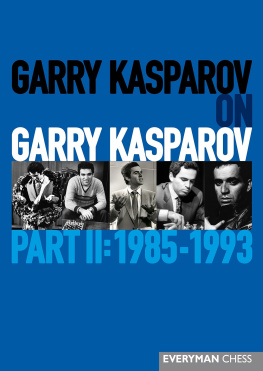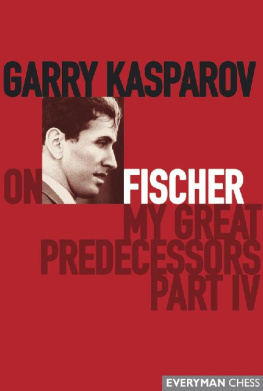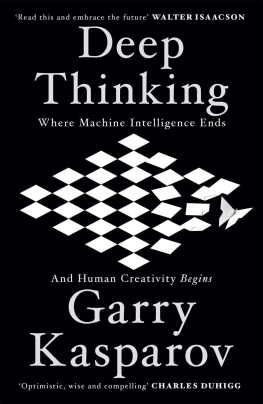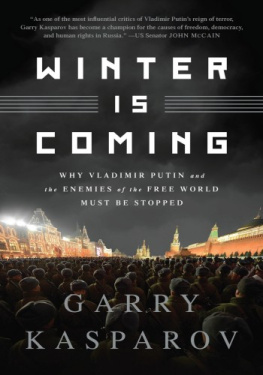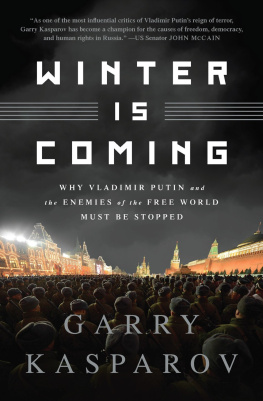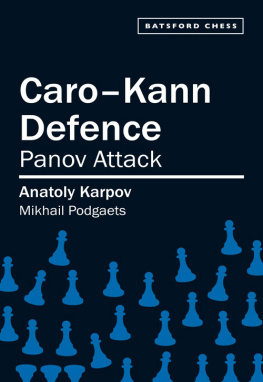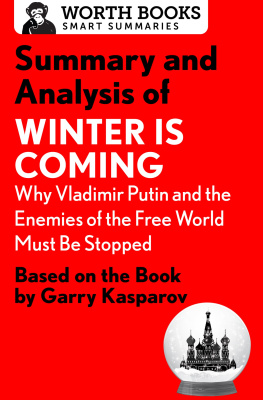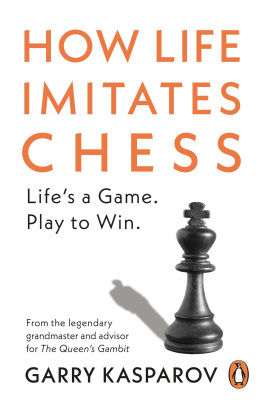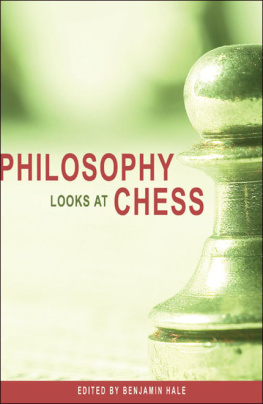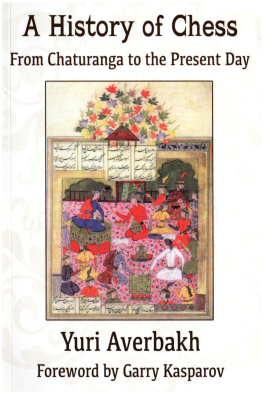First published in 2003 by Gloucester Publishers Limited, Northburgh House, 10 Northburgh Street, London EC1V 0AT
Copyright 2013 Garry Kasparov
English translation 2013 Ken Neat
First published 2013 by Gloucester Publishers Limited
The right of Garry Kasparov to be identified as the author of this work has been asserted in accordance with the Copyrights, Designs and Patents Act 1988.
All rights reserved. No part of this publication may be reproduced, stored in a retrieval system or transmitted in any form or by any means, electronic, electrostatic, magnetic tape, photocopying, recording or otherwise, without prior permission of the publisher.
British Library Cataloguing-in-Publication Data
A catalogue record for this book is available from the British Library.
ISBN Kindle: 978-1-78194-026-6
ISBN epub: 978-1-78194-025-9
Distributed in North America by National Book Network,
15200 NBN Way, Blue Ridge Summit, PA 17214. Ph: 717.794.3800.
Distributed in Europe by Central Books Ltd.,
99 Wallis Road, London E9 5LN. Ph 44(0)845 458 9911.
All other sales enquiries should be directed to Everyman Chess,
Northburgh House, 10 Northburgh Street, London EC1V 0AT
email: info@everymanchess.com; website: www.everymanchess.com
Everyman is the registered trade mark of Random House Inc. and is used in this work under licence from Random House Inc.
Everyman Chess Series
Chief advisor: Byron Jacobs
Commissioning editor: John Emms
Assistant editor: Richard Palliser
Typeset and edited by First Rank Publishing, Brighton.
Cover design by Horatio Monteverde.
Foreword
This second volume of the autobiographical trilogy Garry Kasparov on Garry Kasparov contains one hundred of the most memorable games and endings played during the eight years when I was FIDE champion (1985-1993). This period was the peak of my playing career, as is confirmed by both my competitive results, and the quality of the games.
The era described was an extremely tense and most unusual one for me. In the first four years, from the moment when I won the title of world champion (November 1985) until the conquering of the 2805 rating (November 1989), a cosmic figure for those times, I consolidated my domination in the world chess arena. I twice defended my champions title in dramatic matches with Anatoly Karpov (1986 and 1987), took or at least shared first place in all the tournaments in which I participated, and convincingly won the tournament championship of the planet - the World Cup (1988-1989).
However, the year 1990 began with tragic, extraordinary events. Returning to Baku after lengthy wanderings abroad, I found myself in the very thick of an ethnic conflict - the Armenian pogroms. My mother and I as well as our relatives had to take flight. Thus in the year of the next match for the world championship I was suddenly deprived of both my native home, and my long-standing training base in Zagulba. This was a severe psychological blow, the collapse of my entire customary way of life.
Not surprisingly, at precisely that time my battle with FIDE for the rights of chess players and with the USSR State Sports Committee for professional sport grew into a battle for changes in the country. After settling in Moscow I became an active political figure, inspired by the ideas of Andrey Dmitrievich Sakharov (our acquaintance, unfortunately, was very short-lived).
There were also substantial changes to the composition of my training team, with which I prepared for my fifth match with Karpov. Nikitin departed and, with the exception of Shakarov, no one remained from those who were with me on my way to the chess crown. In this sense too, the 1990 match also became an historic landmark. Despite all the upheavals, I managed to win it, but the history of the legendary team of the 1980s had come to an end: from then on completely new people appeared in it.
From the early 1990s talented young players began assuming the leading roles in chess (Anand, Ivanchuk, Gelfand, Short, Kamsky, Shirov, Topalov), and Karpov and I were no longer able to dominate as we had done before. Paradoxically, in 1991 in none of the super-tournaments in Linares, Amsterdam and Reggio Emilia did either of us take first place! But by effort of will I was able to break the negative trend. With the help of Sergey Makarychev I renovated my opening repertoire - and I won not only Tilburg 1991, but also Linares two years in succession (1992 and 1993).
On this occasion my domination in the chess arena lasted less than two years, but on the other hand this time was perhaps the most fruitful in the creative respect. In clashes with young, inventive and tenacious opponents, some brilliant and unforgettable games were created.
In February 1993 Nigel Short, the winner of the next qualifying cycle, unexpectedly suggested to me that we should play our match for the world championship outside of the FIDE framework. Thinking that this would be a convenient opportunity to at last put chess on a professional basis, I agreed. Because of the rapid rehabilitation after the crisis of 1991, my sense of danger had evidently been dulled. The moment chosen for the declaration of war on FIDE was unfortunate, and the decision taken proved to be a mistake with far-reaching consequences.
In response FIDE President Campomanes took an unprecedented step: stripping me and Short of our rights of champion and challenger, he arranged a match for the world championship between the two reserve candidates who had lost to Short in the qualifying cycle - Timman and Karpov. A new spiral in chess history began ...
I should like to express my gratitude to my former trainers Alexander Nikitin and Alexander Shakarov, and also the chess compilers Vladislav Novikov and Yakov Zusmanovich, for their help in preparing the manuscript for publication.
Chapter One
Match after Match
Matches with Hbner and Andersson
Six-game training matches: Kasparov -Hbner (Hamburg, 27 May - 4 June 1985): 4-1; Kasparov- Andersson (Belgrade, 12-20 June 1985): 4-2.
Preparations for the second match with Karpov began almost at once after Campomaness memorable February press conference, which forcibly terminated the protracted first match without a final result.
Realising that time was short, we drew up a precise schedule for the next six months, including both relaxation and independent work, two training matches (essential practice!), and three twenty-day sessions with the whole training team. Initially we needed to rest on our own after the months of close contact, and to cool down after the sharp and intense disputes. And we separated for a time, each with his own home assignment. But early in May the team assembled in Zagulba for the first session. We worked intensively, mainly on the reconstruction of my opening repertoire and the improving of my positional technique. We also did not forget about physical preparation, the conditions for which were simply ideal.
As far as I remember, the idea of short training matches belonged to Botvinnik, who regarded them as a highly effective method of practical preparation (especially since no appropriate tournaments were anticipated). And I decided to play two successive matches abroad, the opponents and venues being carefully chosen with the future main match in mind. I was to play the West German grandmaster Robert Hbner in Hamburg and the Swedish grandmaster Ulf Andersson in Belgrade. I judged that West Germany and Yugoslavia were ideal places as regards public interest, since, after my criticisms, the roles played by the German Alfred Kinzel (co-chairman of the appeals committee) and the Yugoslav Svetozar Gligoric (the chief arbiter) in the halting of the unlimited match had become topics of heated debate in their own countries.

